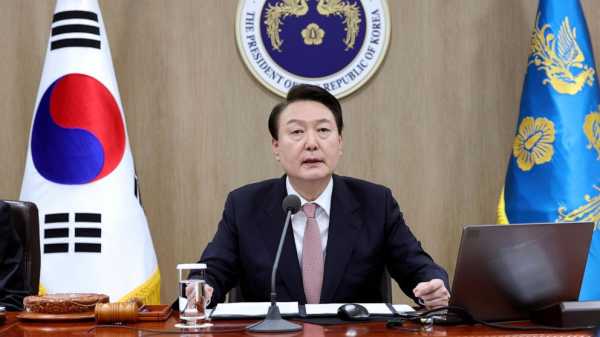
SEOUL, South Korea — South Korean President Yoon Suk Yeol said Tuesday his government will move to restore Japan’s preferential trade status as he pushes to resolve history and trade disputes with Japan despite domestic opposition.
In lengthy, televised comments during a Cabinet Council meeting, Yoon defended his moves, saying that leaving ties with Japan as fraught as they are would be neglecting his duty because greater bilateral cooperation is vital to resolve diverse challenges facing Seoul.
“I thought it would be like neglecting my duty as president if I had also incited hostile nationalism and anti-Japan sentiments to use them for domestic politics while leaving behind the current, grave international political situation,” Yoon said.
He said the need to boost ties with Japan has grown because of North Korea’s advancing nuclear program, the intensifying U.S.-China strategic rivalry and global supply chain challenges.
South Korea and Japan have deep economic and cultural ties and are both key U.S. allies that together host about 80,000 U.S. troops. But their relations have often fluctuated mainly due to issues stemming from Japan's 1910-45 colonial rule of the Korean Peninsula.
At the center of the recent impasse was the 2018 South Korean court rulings that ordered two Japanese companies to compensate some of their former Korean employees for forced labor during Japan’s colonial rule of the Korean Peninsula. Japan refused to accept the rulings, saying all compensation issues had already been settled when the two countries normalized ties in 1965.
The history disputes spilled over to other issues, with the two countries downgrading each other’s trade status. Japan also tightened controls on exports to South Korea, while Seoul threatened to terminate a military intelligence-sharing pact.
After months of negotiations with Japan, Yoon’s government earlier this month announced it would use local funds to compensate the forced laborer victims involved in the 2018 lawsuits without requiring contributions from the Japanese companies.
Last week, Yoon traveled to Tokyo for a summit with Japanese Prime Minister Fumio Kishida, during which they agreed to resume regular visits and economic security talks.
Ahead of the summit, the South Korean government said Japan had agreed to lift export controls on South Korea, and that South Korea would also withdraw its complaint to the World Trade Organization once the curbs are removed. They said the two countries would continue talks on restoring each other’s trade status as well.
Yoon's push has triggered protests from some of the forced labor victims, their supporters and opposition political parties who have demanded direct compensation from the Japanese companies and a direct apology from Tokyo over the forced labor. A public survey suggested about 60% of Koreans opposed Yoon's measures to resolve the forced labor issue.
In his Cabinet Council remarks, Yoon said he will order his trade minister to begin taking legal steps needed to reinclude Japan in a “whitelist” of nations receiving preferential trade status.
He said both South Korea and Japan must remove obstacles that hinder the improvement of bilateral ties. “If South Korea preemptively eliminates obstacles, Japan will surely reciprocate,” he said.
Sourse: abcnews.go.com






